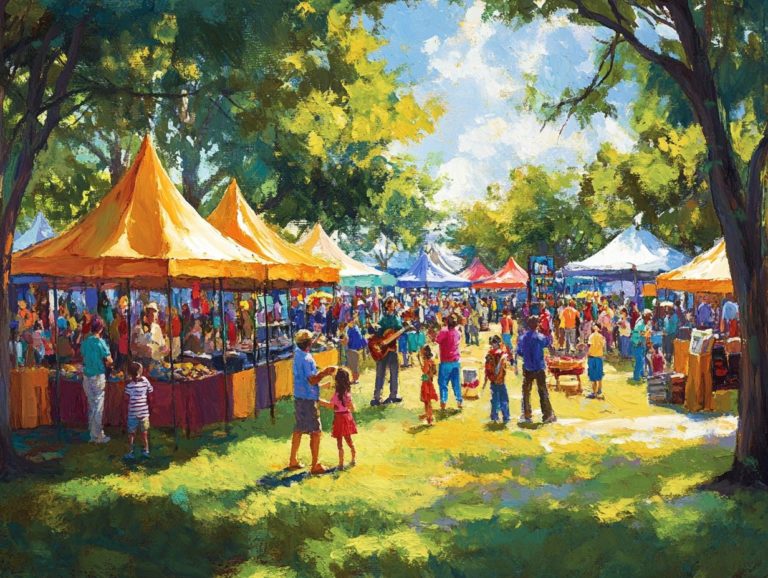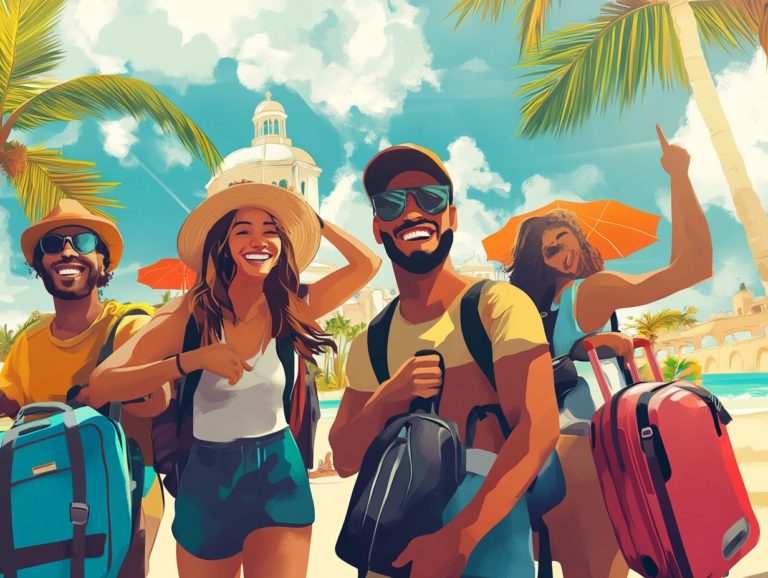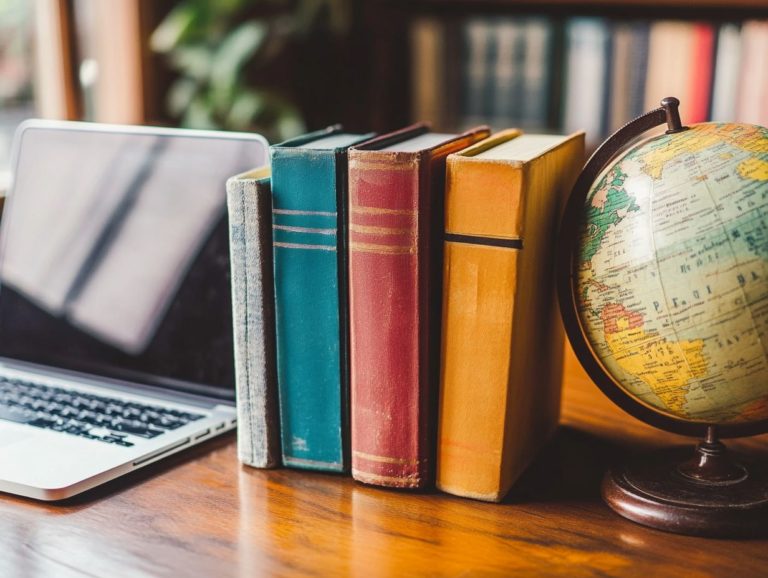Navigating Language Barriers: Travel Tips
Imagine traveling to a new country and easily chatting with locals language shouldn t hold you back! Traveling to new destinations can be an exhilarating experience, yet navigating language barriers often presents its own set of challenges.
Understanding local languages enhances communication and deepens your cultural immersion. This article delves into why overcoming these language obstacles is essential for a seamless journey.
You ll discover practical tips and insights to enrich your travel experiences, from learning basic phrases before you embark on your adventure to leveraging technology for assistance while abroad.
By embracing these challenges, you ll build meaningful connections with locals, transforming your journey into something truly unforgettable.
Contents
- Key Takeaways:
- The Importance of Language in Travel
- Why Language Barriers Can be Challenging
- Preparing for Your Trip
- Communicating Effectively During Your Trip
- Dealing with Miscommunications
- Embracing Cultural Differences
- Frequently Asked Questions
- What is the best way to communicate with locals when facing a language barrier while traveling?
- How can I prepare for language barriers before my trip?
- What should I do if I encounter language barriers while trying to order food or ask for directions?
- Is it important to be patient and understanding when dealing with language barriers while traveling?
- How can I learn a new language while traveling to a foreign country?
- What Cultural Customs Should You Know When Communicating in a Foreign Language?
Key Takeaways:
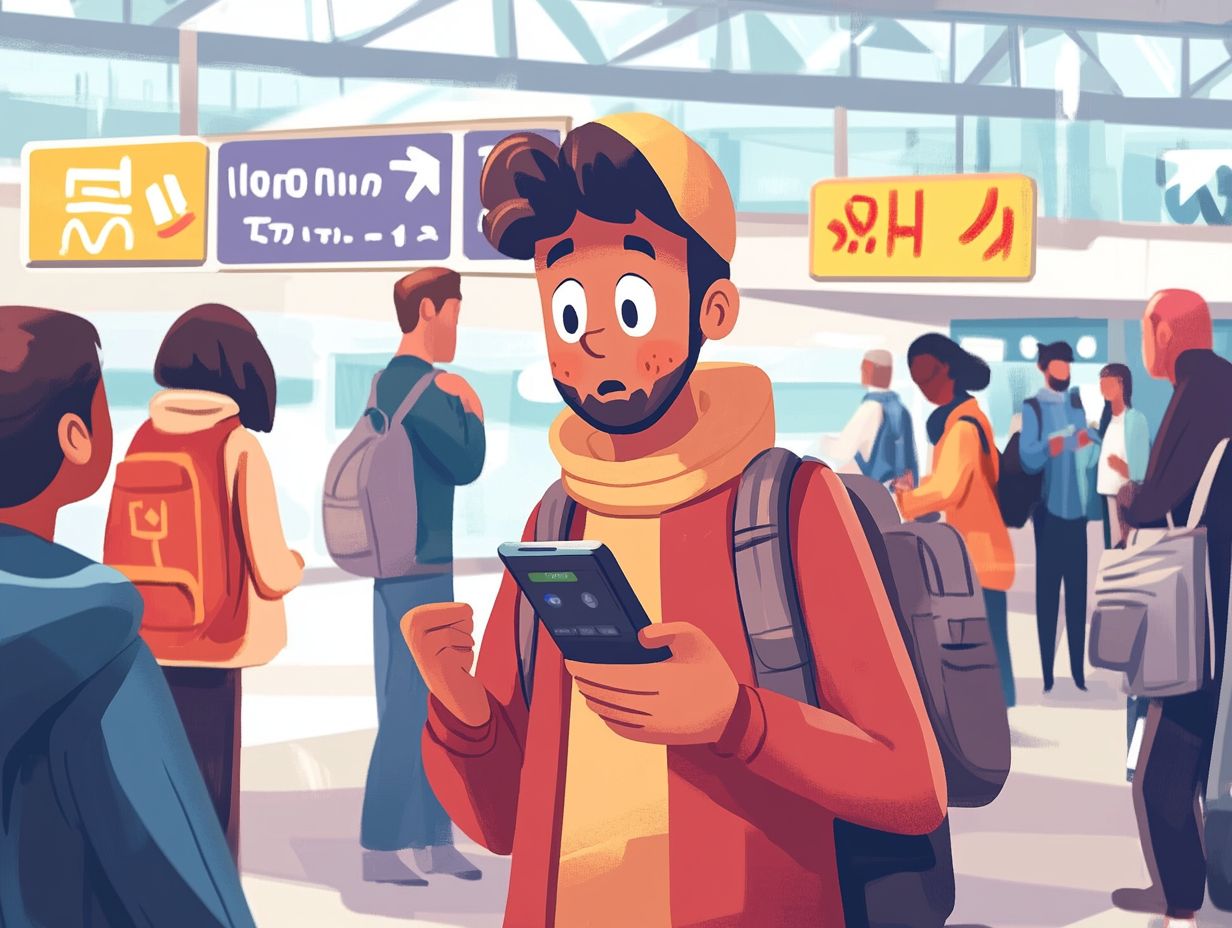
- Prepare for travel by learning key phrases.
- Show respect for local customs.
- Use technology to bridge communication gaps.
The Importance of Language in Travel
Language is fundamental to travel experiences. It influences how you interact with people and engage with the ways of life encountered in foreign lands.
By overcoming language barriers, you can elevate your adventures and forge connections with locals, immersing yourself in their vibrant traditions.
Recognizing cultural differences and mastering effective communication strategies will help you navigate any challenges effortlessly, nurturing positive relationships and creating unforgettable memories.
As you journey through diverse landscapes, appreciating the power of language becomes essential. It enhances your understanding of tourism and cultural exploration, ultimately enriching your perspective of the world.
Why Language Barriers Can be Challenging
Language barriers present significant challenges for travelers, often leading to misunderstandings and communication difficulties that can cloud your overall experience.
You might find yourself in amusing yet frustrating situations, like ordering food at a restaurant and receiving an unexpected dish due to a simple translation error. Imagine intending to request a vegetarian meal and accidentally ending up with a meat-based entr e it s a perfect illustration of how easily miscommunication can occur.
Cultural differences can further complicate interactions. A gesture that s considered polite in one culture might be viewed as rude in another. That s why using non-verbal communication techniques (like gestures), such as facial expressions or body language, is essential.
A warm smile or a thumbs-up can bridge those gaps, fostering a sense of connection and making your journey all the more enjoyable, despite the language hurdles you may encounter.
Preparing for Your Trip
Preparation is key to a successful trip. It helps you overcome language barriers and enrich your travel experience in a foreign country.
Investing time in learning basic phrases in the local language significantly boosts your ability to connect with locals and navigate any communication hurdles you might face.
Get ready by learning essential phrases that will make your journey smoother and more enjoyable. Employing effective travel strategies enhances your comfort and opens the door to a deeper cultural immersion.
Learning Basic Phrases
Learning basic phrases in the local language can significantly enhance your travel experience and make interactions with locals much smoother.
By mastering essential expressions think greetings, polite requests, and crucial questions you can navigate unfamiliar environments with confidence while demonstrating respect for the local culture.
For example, simply saying “hello” or “thank you” in the native tongue can create a friendly atmosphere, often encouraging locals to lend a helping hand.
You can also utilize language-learning apps like Duolingo or Babbel, which provide audio pronunciations and engaging exercises. Watching videos or listening to podcasts can reinforce your learning through real-life contexts, aiding in retention and offering valuable insights into cultural nuances.
Start learning a few phrases today your next adventure awaits!
Researching Local Customs and Culture
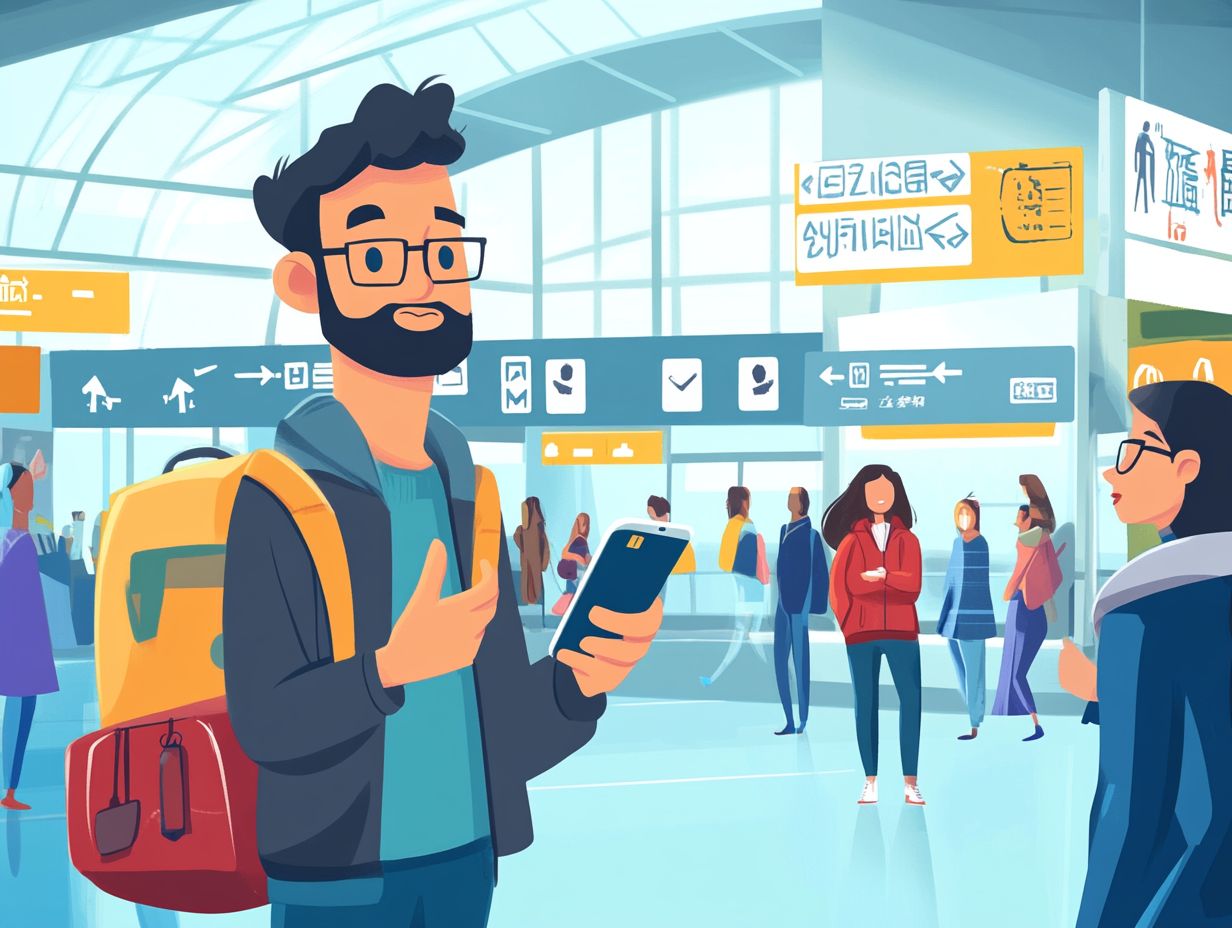
Discovering local customs can transform your travel experience! Researching local customs and culture is essential. It helps you navigate cultural differences with grace and enhances your overall journey.
By immersing yourself in the nuances of local etiquette, you can avoid cultural mistakes that may disrupt your interactions with residents. For example, in some cultures, direct eye contact may be seen as confrontational. In others, it signals honesty and engagement. Understanding these subtle variations fosters understanding and respect for different cultures.
When visiting marketplaces or dining establishments, be mindful of tipping practices and greeting customs. This awareness can greatly enhance your rapport with locals. This insight enriches your journey and creates a more harmonious experience for everyone involved.
Communicating Effectively During Your Trip
Communicating effectively during your trip is crucial for maximizing your travel experiences and forming meaningful connections with locals.
Overcoming language barriers takes effort and creativity. You ll often need to rely on ways to communicate to engage with those around you. By using effective communication strategies, you can build positive relationships, make new friends, and immerse yourself in local culture.
Understanding how to engage with locals can lead to enriching experiences that elevate your adventure to new heights.
Ways to Overcome Language Barriers
Overcoming language barriers may be a common challenge for travelers, but several effective strategies can help you communicate in foreign countries.
These techniques can significantly enhance your travel experience by fostering connections and ensuring smoother interactions with locals. For instance, consider hiring a bilingual guide who speaks both your language and the local dialect; this can bridge communication gaps effectively.
Non-verbal communication is vital, too. Gestures, facial expressions, and body language can convey messages when words fail. You might also use visual cues, like maps or pictures, to point out your needs. Picture yourself asking for directions using a map, complemented by friendly gestures; this not only aids understanding but also creates a more engaging encounter.
Using Technology to Assist
In the digital age, technology is your best ally in breaking through language barriers. A variety of translation apps and tools are designed specifically for travelers like you.
With so many options available, each with unique features, you can easily find one that fits your specific needs. For example, Google Translate excels with its text and voice translation capabilities, allowing you to engage in smooth, real-time conversations. Conversely, iTranslate stands out for its offline features, perfect for those moments when internet access is spotty.
Voice translators enhance your experience even further, enabling you to converse verbally in different languages and making interactions truly memorable. To get the most out of these apps, familiarize yourself with their functionalities before you set off on your journey.
As you explore new cultures, approach their nuances with sensitivity. These tools serve not just as a means of communication; they act as a bridge to foster understanding and connection with the locals you meet.
Dealing with Miscommunications
Miscommunications are an inevitable aspect of travel, especially when encountering language barriers. Yet, you can approach these moments with patience and understanding. This way, potential frustrations can turn into opportunities for connection and growth.
Tips for Handling Difficult Situations

Handling difficult situations stemming from misunderstandings can be quite a challenge. However, employing specific strategies can significantly mitigate these issues.
To navigate these complexities effectively, it s crucial to remain composed and patient, even when emotions run high. Approach conversations with a mindset focused on understanding rather than reacting. This truly makes all the difference.
Utilizing ways to communicate respectfully like actively listening and reframing what the other person has said fosters a more open dialogue. Maintaining a positive outlook can transform a potentially volatile discussion into a collaborative problem-solving session.
Being open to clarification encourages transparency and promotes a sense of mutual respect, which can greatly ease tensions and lead to more effective resolutions.
Embracing Cultural Differences
Embrace cultural differences to supercharge your travel adventures! By demonstrating respect for local customs and traditions, you can navigate the intricacies of cultural immersion. This ultimately leads to a richer understanding of the places you explore.
Engaging with locals offers unique insights into their cultures. These interactions create opportunities for enriching conversations and shared moments. Recognizing and appreciating cultural differences not only enhances your travel experiences but also fosters lasting memories and connections that transcend borders.
Respecting and Learning from Different Cultures
Respecting and learning from different cultures is essential for crafting meaningful and enjoyable travel experiences.
By engaging thoughtfully with local traditions, you deepen your understanding of diverse perspectives and enrich your journey. For instance, when visiting a sacred site, observe local customs such as dress codes and behavior. This honors the significance of the place and opens the door to dialogue with locals.
Participating in traditional festivals or workshops provides invaluable insights into the history and values of a community. Such interactions promote cultural sensitivity and foster an environment where respect and shared experiences enhance your enjoyment, creating a lasting bond between you and your destination.
Frequently Asked Questions
What is the best way to communicate with locals when facing a language barrier while traveling?
Here’s how to communicate with locals: use basic phrases and gestures, such as “hello,” “thank you,” and pointing to help convey your message. A translation app can also help.
How can I prepare for language barriers before my trip?

Before your trip, research common phrases and words in the local language to familiarize yourself. Learn some basic customs and cultural norms to avoid potential misunderstandings.
What should I do if I encounter language barriers while trying to order food or ask for directions?
If you encounter language barriers while ordering food or asking for directions, try using visual aids such as pictures or pointing to items on a menu or map. You can also find someone who speaks both your language and the local language to help translate.
Is it important to be patient and understanding when dealing with language barriers while traveling?
Yes! It’s crucial to remain patient and understanding when facing language barriers while traveling. Remember, communication is a two-way street, and it may take time to convey your message or understand the locals.
How can I learn a new language while traveling to a foreign country?
Try signing up for language classes or cultural immersion programs to learn a new language while traveling. Additionally, practice with locals and use language learning apps to improve your skills.
Start your journey today and immerse yourself in new cultures!
What Cultural Customs Should You Know When Communicating in a Foreign Language?
Respecting cultural customs is crucial when communicating in a foreign language.
Different gestures and phrases can have unique meanings across cultures. Being aware of these differences helps you avoid unintentional offense.
Always approach communication with curiosity and an open mind!

